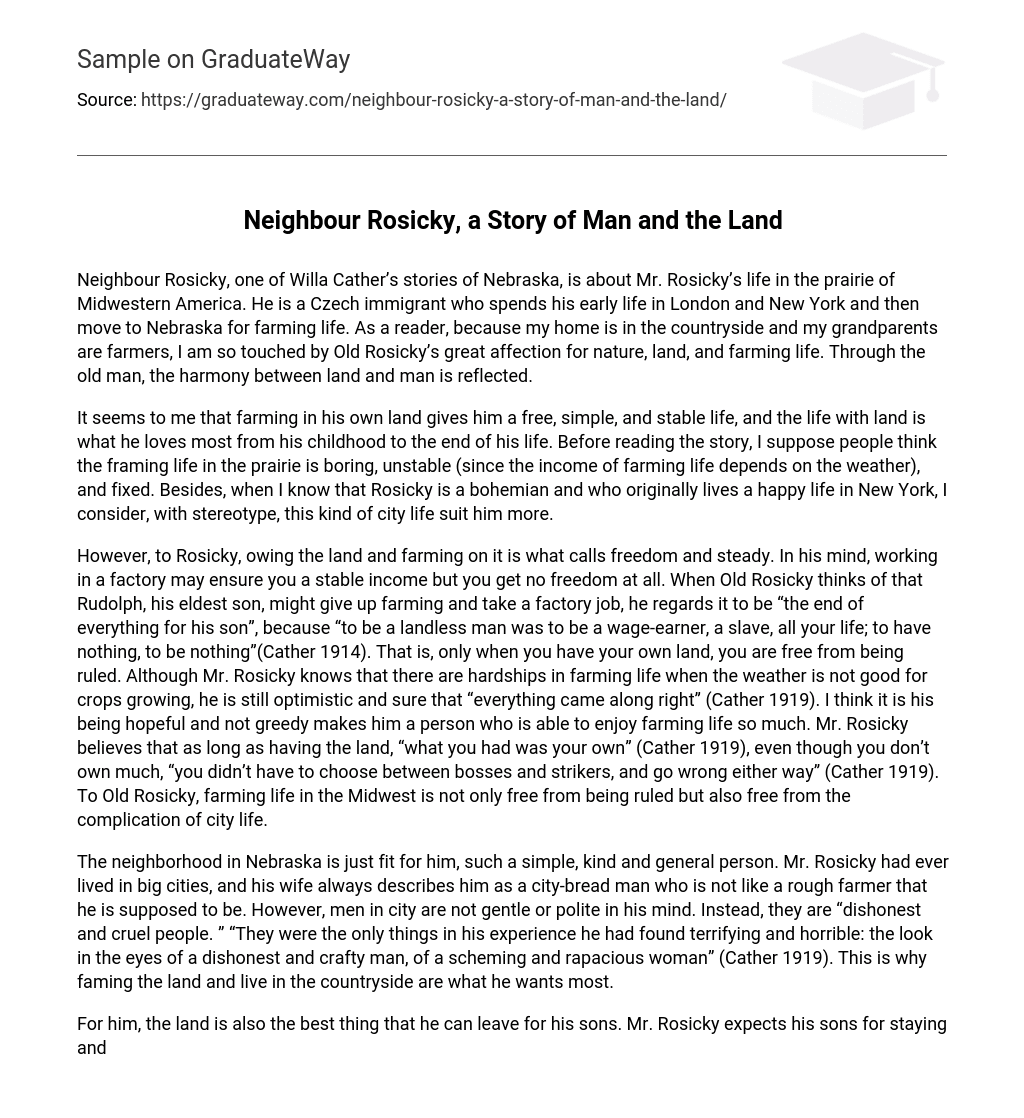Neighbour Rosicky focuses on the life of Mr. Rosicky in the prairie of Midwestern America. Originally from Czechoslovakia, he first resides in London and New York before settling in Nebraska to pursue a farming lifestyle. As someone who comes from a rural background with farmer grandparents, I am deeply moved by Old Rosicky’s profound love for nature, the land, and the farming way of life. Through this elderly character, the story beautifully highlights the harmonious relationship between land and humanity.
It appears that farming on his own land provides him with a free, uncomplicated, and steady existence; and a life connected to the land is what he has cherished since childhood until the end of his days. Prior to reading this story, one might assume that life as a farmer on the prairie is monotonous, insecure (given the reliance of farming income on weather conditions), and unchanging. Moreover, considering that Rosicky is originally from Bohemia and had been living a content life in New York, I stereotypically think that urban life would suit him better.
Rosicky believes that owning and farming land provides him with freedom and stability. He sees working in a factory as sacrificing personal freedom for a steady income. The idea of his son, Rudolph, abandoning farming for a factory job devastates Rosicky because he views it as losing everything – becoming landless means being a lifelong wage-earner and essentially a slave. To him, owning land equals freedom from rule or control. Despite the challenges of farming, such as unpredictable weather, Rosicky remains optimistic and trusts that things will work out. His hopeful and selfless nature enables him to find joy in the farming life. Having your own land means having something truly yours, avoiding the conflicts between bosses and workers that plague urban life. For Rosicky, farming in the Midwest signifies not only freedom from rule but also liberation from the complexities of city living.
Mr. Rosicky is a simple, kind, and down-to-earth person who finds the neighborhood in Nebraska to be the perfect fit for him. Although he has previously lived in big cities, his wife believes that he is better suited for urban life rather than the rugged lifestyle of a farmer. However, Mr. Rosicky disagrees and feels that city men lack gentleness and politeness, perceiving them as “dishonest and cruel people.” According to Cather (1919), the only thing that terrifies and horrifies him is the deceitful gaze of a cunning man or a conniving woman. This is why his greatest desire is to farm the land and live in the countryside.
Mr. Rosicky sees the land as his most valuable inheritance for his sons, hoping they will carry on the work despite potential challenges. He believes that once he is gone, they won’t encounter significant obstacles. The narrative depicts Mr. Rosicky as consistently mindful of his loved ones, inspiring them to become compassionate and magnanimous individuals. Consequently, his sons will mature into gentle and straightforward men, mirroring their father’s character. Men of simplicity tend to perceive others in a similar uncomplicated manner.
Therefore, they might be vulnerable to harm when they are in the company of dishonest and cruel individuals. The Rosickies find life in the countryside much easier, and Mr. Rosicky finds a sense of security in farming that shields him from the complexities of city life. In addition to avoiding the negative aspects of city living, being away from urban areas allows Mr. Rosicky to connect with nature. He compares himself to a tree with a single deep taproot, emphasizing his desire to establish a strong connection to the land. According to the story, the farm in the Midwest is where he longs to establish this deep-rooted connection.
Mr. Rosicky had an enjoyable life in his youth in New York, where he would attend operas every weekend thanks to his successful financial endeavors. However, he soon grows weary of this lifestyle. He describes cities as an “unnatural world” that separates individuals from the Earth itself and prevents them from having any connection to the ground (Cather 1911). It becomes difficult for someone like Mr. Rosicky, who possesses a deep love for the land and nature, to bear a life devoid of contact with true soil. As a result, he decides to relocate to the Midwest, where he deeply appreciates the land.
The text highlights the deep connection Old Rosicky has with his land and nature. He prioritizes the simple joys of owning land, appreciating the ability to witness the sunrise and sunset, plant and witness growth. This connection extends even beyond death, as he views being buried in the graveyard on the edge of his land as a peaceful slumber in Mother Nature’s embrace. It provides comfort knowing he will never be far from his home, land, and loved ones. The proximity of the graveyard allows him to rest under the open sky, surrounded by the familiarity of his own hayfield. The novel Neighbour Rosicky showcases the importance and significance of land in a man’s life, with Mr. Rosicky having a profound and touching relationship with nature. Farming provides him with freedom and allows him to take control of his life, shielding him from the negative aspects of city living. His devotion to his neighborhood and closeness to nature are evident in his unwavering attachment to the land.





